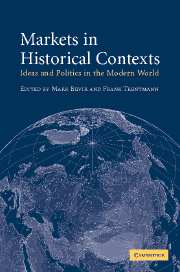Book contents
- Frontmatter
- Contents
- Acknowledgements
- List of contributors
- 1 Markets in historical contexts: ideas, practices and governance
- 2 Improving justice: communities of norms in the Great Transformation
- 3 The politics of political economy in France from Rousseau to Constant
- 4 Tories and markets: Britain 1800–1850
- 5 Guild theory and guild organization in France and Germany during the nineteenth century
- 6 Thinking green, nineteenth-century style: John Stuart Mill and John Ruskin
- 7 Tönnies on ‘community’ and ‘civil society’: clarifying some cross-currents in post-Marxian political thought
- 8 German historicism, progressive social thought, and the interventionist state in the United States since the 1880s
- 9 Civilizing markets: traditions of consumer politics in twentieth-century Britain, Japan and the United States
- 10 The ideologically embedded market: political legitimation and economic reform in India
- 11 The locational and institutional embeddedness of electronic markets: the case of the global capital markets
- Index
2 - Improving justice: communities of norms in the Great Transformation
Published online by Cambridge University Press: 22 July 2009
- Frontmatter
- Contents
- Acknowledgements
- List of contributors
- 1 Markets in historical contexts: ideas, practices and governance
- 2 Improving justice: communities of norms in the Great Transformation
- 3 The politics of political economy in France from Rousseau to Constant
- 4 Tories and markets: Britain 1800–1850
- 5 Guild theory and guild organization in France and Germany during the nineteenth century
- 6 Thinking green, nineteenth-century style: John Stuart Mill and John Ruskin
- 7 Tönnies on ‘community’ and ‘civil society’: clarifying some cross-currents in post-Marxian political thought
- 8 German historicism, progressive social thought, and the interventionist state in the United States since the 1880s
- 9 Civilizing markets: traditions of consumer politics in twentieth-century Britain, Japan and the United States
- 10 The ideologically embedded market: political legitimation and economic reform in India
- 11 The locational and institutional embeddedness of electronic markets: the case of the global capital markets
- Index
Summary
In 1775 William Pultenay suffered the loss of his childless English cousin and so acquired the charge of the estates and title of the Earl of Bath. On removing to England he left the management of his own estate of Solway Bank in his native Scotland in the hands of John Maxwell, a theoretical improver, whom he made factor. Their extensive correspondence reveals to us Maxwell's education into the nature of change in rural Scotland. He began his work with the assumption that the impediment to efficiency and economic rationality was the farmers:
Country people such as we have in this place in the world, constantly accustomed to enter farms exhausted by the unrestrained licence allowed their predecessors, and to labour only to the easiest and most immediate produce, cannot by any means be brought to raise their ideas to the advantages of entering to a well-conditioned farm, nor to look upon restraints to regular husbandry, such as your tacks [leases] preserve, in any other light than as so many drawbacks to their profit.
His solution to this problem was one familiar to students of landlord–tenant relations and physiocratic economic theory; he proposed that leases should more exactly specify the methods farmers should use and the powers retained by the landlord and his agent over the farms: ‘I am humbly of the opinion that the person employ'd should be daily going about the farms, observing the conduct of the tenants, and chequing abuses, which should be daily committed, or attempted to be committed.’
- Type
- Chapter
- Information
- Markets in Historical ContextsIdeas and Politics in the Modern World, pp. 25 - 45Publisher: Cambridge University PressPrint publication year: 2004



